Mexico. New President, old president
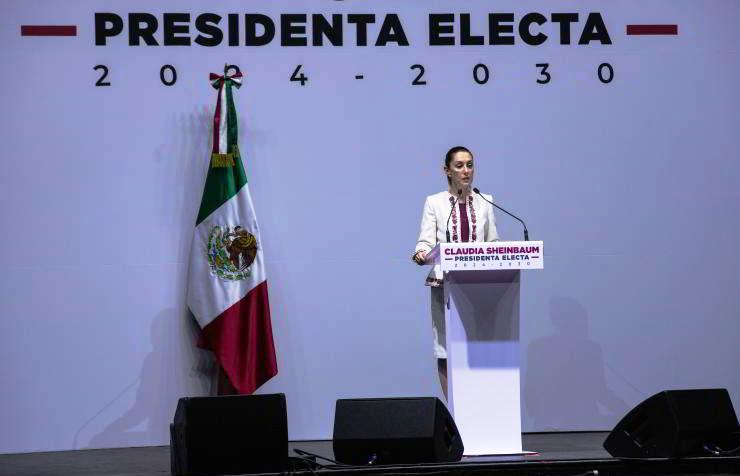
Claudia Sheinbaum Pardo is the heir apparent of Amlo, the outgoing president. She will lead the second country in Latin America by population. Many challenges to face from corruption to violence.
From October 1st, Claudia Sheinbaum, will lead Mexico. In the elections of June 2nd, she clearly beat (36 million votes against 16.5, over 30 percentage points), the senator of indigenous origin Xóchitl Gálvez. Claudia Sheinbaum will take the place of her mentor Andrés Manuel López Obrador (Amlo), founder of Morena (now the country’s leading party) and a president as popular as he is controversial. Since his entry into the political arena, Amlo’s mission has been summed up in one phrase: “Por el bien de todos, primero los pobres” (For the good of all, first of all the poor), a praiseworthy statement, but a very demanding one. Certainly, after decades of domination by the two conservative parties (PAN and PRI), his presidency – perhaps classifiable as “centre-left populism” – was an absolute novelty.
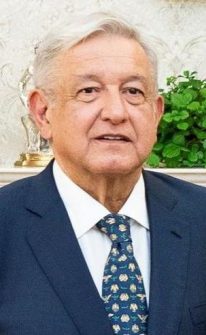
Former president Andrés Manuel López Obrador (Amlo), founder of Morena. President Amlo had proposed a package of twenty constitutional reforms.
During his six years in office, public spending on social programs increased significantly, but the fundamental problems – insecurity and poverty above all – remained unsolved. Despite six increases in the minimum daily wage (from 88 pesos in 2018 to 249 currently, equivalent to about 13 euros), the level of poverty remained high. According to data from Coneval (an autonomous constitutional body), 46.8 million people live in poverty, equivalent to 36.3 percent of the country’s population. Of these, over nine million (7.1 percent) are affected by extreme poverty.
Due to the strange games of politics and economics, Mexican billionaires have seen their fortunes increase (significantly) during Amlo’s six-year term. Behind Carlos Slim (seventeenth in the Forbes world ranking), there are 13 other people: this very small group of privileged people – says a report by Oxfam Mexico – controls 8 percent of the country’s overall economy. Things didn’t go any better in terms of security. Amlo’s policy summarized in the slogan “abrazos, no balazos” (embraces, not bullets) has failed, judging by the number of murders and disappearances, which is always very high.
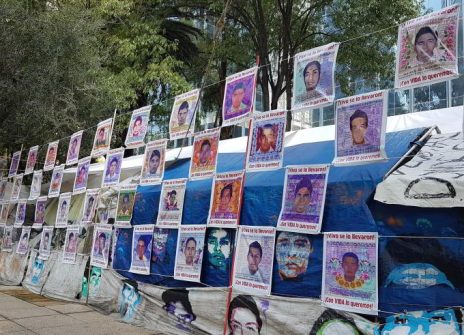
Photos of the missing 43 Mexican students from the town of Ayotzinapa. About 110,000 people have disappeared since 1964 and have never been found. File swm
In the first four months of 2024, the average was 81 murders per day. In the statistics of the last six years, two figures are also impressive: the killing of 9 Catholic priests and 44 journalists.
According to Article 19, an independent and non-partisan Mexican organization that promotes freedom of expression, in 2023 there were 561 attacks on journalists or media in the Latin American country, a higher number than in the governments that preceded Amlo.
This is Obrador’s heavy legacy. That said, we must ask ourselves whether Claudia will be a mere executor of the wishes of the outgoing president, her great sponsor and political father, or whether she will manage to be autonomous and choose her own path.
Claudia Sheinbaum’s curriculum vitae
Born into a family of non-practising Jews, a chemist father with parents from Lithuania, a biologist mother with parents from Bulgaria, a degree in physics from the Universidad Autónoma de México (Unam), a master’s degree from Berkeley and a doctorate, Claudia Sheinbaum is a former mayor of Mexico City.
For years, Amlo has been talking about a “fourth transformation” of Mexican life. In his intentions, it is an indispensable historical passage after the previous three phases: the war of independence (1810-1821), the period of reform (1858-1861) and the years of the revolution (1910-1917), culminating with the promulgation of the Mexican Constitution (5 February 1917).
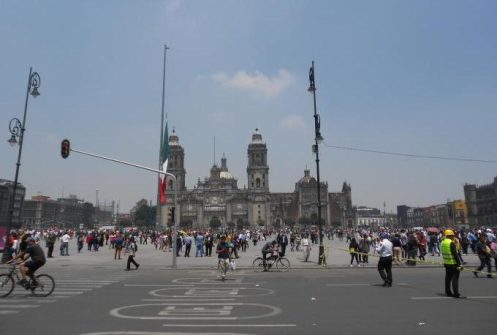
About 46.8 million people live in poverty, equivalent to 36.3 percent of the country’s population. File swm
Claudia Sheinbaum has promised several times that she will continue on the path marked out by Amlo to follow up on the fourth transformation. It will then be interesting to see how the president will address the climate issue in a country that is already suffering the consequences with extraordinary peaks of heat and serious shortages of water.
Her resume speaks in her favour, as she has collaborated with United Nations scientists gathered in the Intergovernmental Panel on Climate Change (IPCC). However, her choices before the election have been contradictory. She has in fact been accused of having supported the Tren Maya, the great work of AMLO contested by environmentalists. On the energy front, Claudia Sheinbaum has confirmed that she wants to increase renewable sources, without forgetting that Mexico is the eleventh world producer of oil through Pemex (Pétroleos mexicanos), a company entirely owned by the state. The president says that it will not be privatized, despite being burdened by a heavy debt.
The next-door neighbour
The day after Claudia Sheinbaum’s election victory, US President Joe Biden called the elected official to congratulate her. It was predictable, considering that Mexico and the United States share many businesses and problems. The Latin American country is the second largest trading partner of the United States after Canada. Furthermore, 11 of the 12 million Mexicans born in their country but living abroad reside in the United States, generating a huge flow of remittances.
Finally, the majority of illegal migrants headed to the United States pass through the northern border of Mexico – 3,169 kilometres long – one of the most debated issues in the electoral contest between Biden and his challenger Trump.
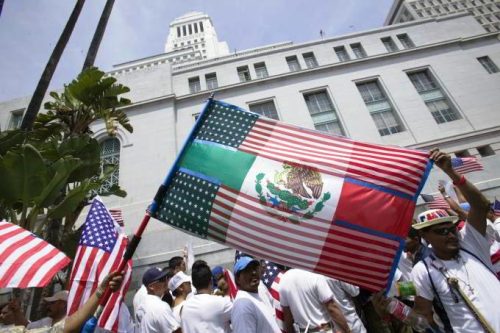
The Mexican flag is superimposed on the American flag. Thousands of immigrants take part in a march to protest against the US Congress’s illegal immigration reform. 123rf
The scale of the problem is highlighted by one figure: in the month of December 2023 alone, the US border police stopped 250,000 migrants trying to cross the border between Mexico and the United States.
What will happen if the Republican candidate prevails in the November 5 elections? During the long election campaign, Trump has stated that, after his victory (which he takes for granted), he will deport millions of undocumented immigrants. According to the Pew Research Center, they number about 11 million. Of these, 4.1 million (40 per cent) are Mexicans, making them by far the largest group of undocumented (illegal) immigrants, preceding in order those from El Salvador, India, Guatemala and Honduras.
The new reform of the judiciary
The Mexican situation is complicated by another relevant issue, internal to the country. President Amlo had proposed a package of twenty constitutional reforms, on rights and the environment but also the controversial reform of the judicial system that was approved last September 4.To come into force, it will now also have to be approved by the majority of the individual state parliaments, but there is little doubt that this will happen: López Obrador’s party and his centre-left allies have a majority in 25 of the 32 state parliaments.
The discussion of the reform in the Senate had begun on Tuesday evening, and was interrupted after a group of protesters with megaphones and Mexican flags broke into the building asking the senators to block the vote. In the end, shortly after midnight local time, the reform was approved with 86 votes in favour and 41 against.
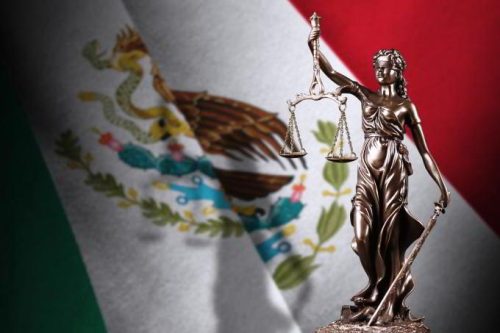
Mexico flag with statue of lady justice and judicial. The reform of the judicial system approved last September 4, highly contested. 123rf
The reform has been highly contested in recent weeks: at the end of August there was a large strike by judges and court workers, which the Mexican Supreme Court also decided to join. The most criticized point is the one that proposes to make the positions of federal judges, who are around 1,650, and of the judges of the Supreme Court itself elective.
Currently, the judges of the federal courts are appointed by the Court on the basis of qualifications, educational degrees and years of experience. The members of the Supreme Court are instead proposed by the president and appointed by the Senate for a renewable term of 15 years: López Obrador’s reform would reduce their number from 11 to nine, and shorten their term from 15 to 12 years.
The reform is one of the most significant changes to the Mexican judicial system in recent decades and should be seen as part of a progressive deterioration in relations between López Obrador and the judiciary, especially the Supreme Court, which in the last year has prevented the implementation of several of the president’s proposals. Mexico’s president-elect Claudia Sheinbaum is in favour of the reform.
Labor unions and trade associations, as well as some legal experts, say that moving to an elective system — in which judges must run and campaign, in a country with serious corruption problems — could politicize the judiciary and make it more dependent on the government. (Open Photo: Shutterstock/Octavio Hoyos)
Paolo Moiola/MC



